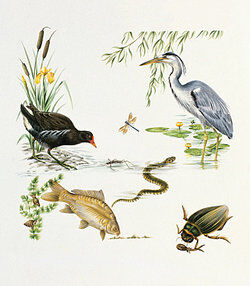Copepod Definition
kōpə-pŏd
copepods
noun
copepods
Any of a class (Copepoda) of small, sometimes parasitic, crustaceans living in either salt or fresh water.
Webster's New World
Synonyms:
- copepod crustacean
Other Word Forms of Copepod
Noun
Singular:
copepodPlural:
copepodsOrigin of Copepod
-
From New Latin Cōpēpoda order name Greek kōpē oar kap- in Indo-European roots New Latin -poda -pod
From American Heritage Dictionary of the English Language, 5th Edition
Related Articles
Find Similar Words
Find similar words to copepod using the buttons below.

